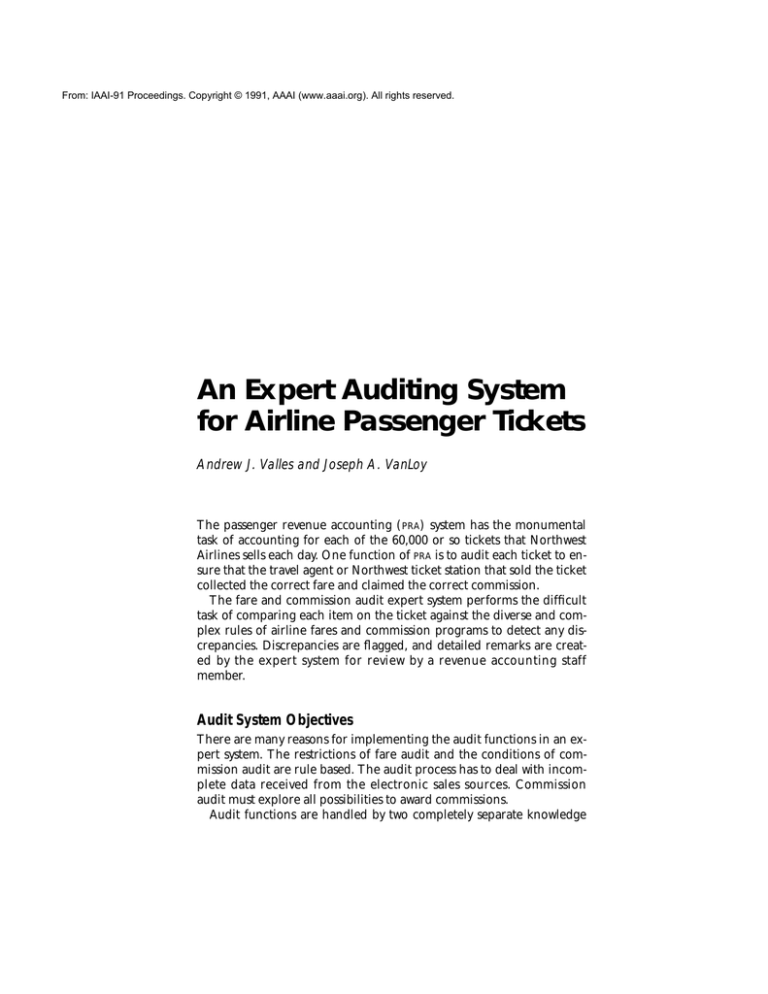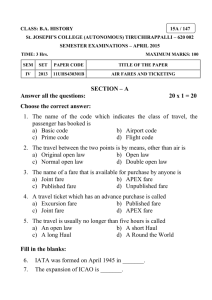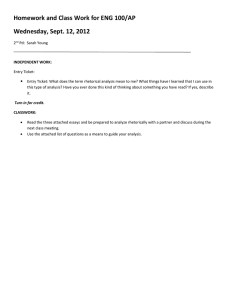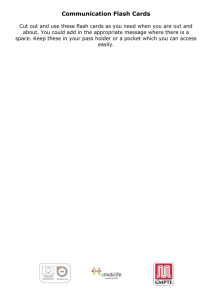An Expert Auditing System for Airline Passenger Tickets
advertisement

From: IAAI-91 Proceedings. Copyright © 1991, AAAI (www.aaai.org). All rights reserved. An Expert Auditing System for Airline Passenger Tickets Andrew J. Valles and Joseph A. VanLoy The passenger revenue accounting (PRA) system has the monumental task of accounting for each of the 60,000 or so tickets that Northwest Airlines sells each day. One function of PRA is to audit each ticket to ensure that the travel agent or Northwest ticket station that sold the ticket collected the correct fare and claimed the correct commission. The fare and commission audit expert system performs the difficult task of comparing each item on the ticket against the diverse and complex rules of airline fares and commission programs to detect any discrepancies. Discrepancies are flagged, and detailed remarks are created by the expert system for review by a revenue accounting staff member. Audit System Objectives There are many reasons for implementing the audit functions in an expert system. The restrictions of fare audit and the conditions of commission audit are rule based. The audit process has to deal with incomplete data received from the electronic sales sources. Commission audit must explore all possibilities to award commissions. Audit functions are handled by two completely separate knowledge 4 VALLES AND VANLOY bases: the fare audit knowledge base and the commission audit knowledge base. Fare Audit Before airline deregulation, the amount of money one person spent for a coach class seat was exactly the same as every other passenger. This situation, of course, is no longer true. A passenger might well spend a different amount for a flight than the passenger seated across the aisle. Each different price category, along with its associated restrictions, is known as a fare. One of the difficulties in auditing fares is the large number of diverse restrictions that can be placed on a fare. These restrictions range from a simple advance purchase restriction (for example, this fare must be purchased at least 14 days before departure) to a more complex combinability restriction (for example, this fare cannot be combined with any other fare unless service for each flight segment is provided by the same carrier). The volume of fares was also a system concern because at any given time, a market (origin–destination city pair) can have as many as 100 different fares for a single airline. Also, an airline can change the restrictions for as many as 100,000 fares in a single day, making maintenance of the system a definite concern. Auditing every fare sold by both travel agents and airline ticket offices offers definite benefits, the greatest benefit being the ability to monitor ticket sales to ensure that fares are sold without violating specified restrictions. Selling travel agencies and Northwest ticket stations are notified of discrepancies and, when appropriate, assisted with ways to avoid future mistakes. The Fare Audit Knowledge Base The fare audit knowledge base is fed from two sources (figure 1). The first source is the electronic transmission of ticket sales information from clearinghouses located worldwide. All airline ticket sales are reported to the appropriate regional clearinghouse. Every airline receives periodic transmissions from each clearinghouse of its ticket sale information. This information reveals the place the ticket was sold, the fare that was used, the date of sale, and the flight information. The second source of data is the fare database. This database is formed from daily transmissions from the Airline Tariff Publishing Company (ATPCO). Federal law requires airlines that fly to, from, or within the United States to file their fares with ATPCO. International airlines file AUDITING AIRLINE PASSENGER TICKETS 5 Ticket DB Electronic Transmissions Fare eDB Split Results Data Formatter Expert System Audit Contract DB Marketing Contract Input Ticket DB Audit Review DB Update of Errors of Correct Tickets Figure 1. Audit Process Flow. fares with ATPCO voluntarily. Therefore, this database contains historical information on nearly every airline fare. Before a ticket is fed into the fare audit knowledge base, a C program retrieves the restrictions for each fare found on the ticket. The restrictions are then formatted by this program and sent to the knowledge base along with the ticket sale information. Each fare restriction that can be specified falls into a single category (such as advance purchase or combinability). The knowledge base has approximately 250 rules. These rules pertain to each restriction found within a category. The rule-based nature of the knowledge base allows any combination of the restrictions to be checked without relying on another restriction to be specified. This approach makes the knowledge base static in nature: The only changes that are required will be prompted from changes in how the fares are filed with ATPCO. ATPCO rarely changes the method for filing fares. The categories of fare restrictions can be used in conjunction to form a single meaning (for example, this fare must be used on flight 142, or it must only be used on Monday). Therefore, after all the categories are audited, a final examination of the data must be completed to see if any of the category restrictions were not met. The knowledge base checks the restrictions and, if errors are found, puts out a textual message stating what is in error (for example, “This fare must be purchased 14 days before departure but was only purchased 6 days before departure.”). These messages will appear directly on a memo to the selling agent or airline station, notifying it of the discrepancy (figure 2). 6 VALLES AND VANLOY Memo Number NORTHWEST AIRLINES Memo Date 19 Aug 90 Northwest Airlines, Inc. Agency Sales Accounting, Department B4920 Minneapolis/St. Paul International Airport Phone # (612)726-2427 Fax# (612)726-0585 Agency Number Ticket Number 0129999999999 Please include payment on your next sales report for the amount due airline shown on the stub below. Detach the stub and forward it with the next sales report. Pay only the amount shown. If you have any information which would cancel or revise this charge, indicate the reason and return this memo intact to the address shown above. Date of Ticket Validation Reason For Debit Memo: Reported commission is less than audited commission. Too many days passed between ticket booking date and issuance. Fare 01 Rule Number 4087: 1 day or less are allowed Fare 01 from reservation to ticket issuance, but the Fare 01 ticket shows 3 days Fare 02 Rule Number 4087: 1 day or less are allowed Fare 02 from reservation to ticket issuance, but the Fare 02 ticket shows 3 days Reported tax is less than audited tax. Print Number 0 Issuing Unit 4920 23 Jul 90 Your Report Period Ending 29 Jul 90 Passenger DEBIT Grudowens Correct Computation Via Fare From/To HXE2P50 HXE2P50 HWE2P50 HWE2P50 LIT/MEM MEM/BHM BHM/MEM MEM/LIT NW NW NW NW 120.14 240.26 Total Fare 120.12 Tax Commission Total Our Computation 240.26 19.22 24.03 235.45 Your Computation 182.87 14.63 18.29 179.21 57.39 4.59 5.74 56.24 Difference USD Figure 2. Sample Discrepancy Memo. Commission Audit Airline commissions are much the same as commissions in other industries. A commission is paid to a travel agent in exchange for the agent selling a ticket that includes travel on this airline. Northwest Airlines ticket stations do not receive commissions; therefore, a commission audit is not performed on tickets sold by these stations. There are several difficulties with auditing commissions. First, Northwest Airlines has nearly 60,000 tickets sold each day by travel agents throughout the world. Most of these tickets are available for commissions; so, the volume of tickets that must go through the audit is large. Second, Northwest has more than 40,000 commission programs with travel agents. These programs can specify a large number of conditions for payment. Some commission (or marketing) programs state the entire ticket must be flown on Northwest Airlines; others state commissions are only paid on transpacific flights; and still others state only certain flight, date, and market combinations are available for commissions. Agents do not specify what commission programs they are claiming payment for when reporting commissions, only the AUDITING AIRLINE PASSENGER TICKETS 7 amount of commission they are taking. Therefore, determining what commission programs a ticket might be eligible for made commission audit difficult. Auditing commissions allows Northwest Airlines to correctly identify what commission programs are found on a ticket and perform the appropriate accounting. It also shows the programs to which agents are responding and allows the airline to verify that commissions being taken by an agent were earned. The system also identifies commissions that agents are eligible for that they did not originally claim. The Commission Audit Knowledge Base The commission audit knowledge base is also fed from two sources (figure 1). The first source is the same daily electronic transmission of ticket sales that the fare audit receives. The second source of data is the marketing contract database. This database contains all the commission programs between Northwest and travel agents. The Northwest marketing department maintains this database through a separate graphic user interface. This interface allows the user to specify a condition about any item of data available on the ticket. The user can also combine conditions by using various operators (for example, “ALL flight coupons must be on flight 10 OR 11,” “ONE OR MORE flight coupons must be on flight 30”). These commission programs are retrieved by a C program based on selection criteria from each ticket. The ticket sale information and associated commission programs are formatted and sent to the knowledge base. Although fare rules fit into distinct categories, the commission programs have conditions that are much more complex. For example, a commission condition might state “Each flight segment must be flown on Northwest, and flight segment 2 cannot occur on Wednesday, and one or more flight segments must be on flight 48.” Such conditions generate hundreds of thousands of possible combinations, making it prohibitive to code an expert system rule for each possible combination. The solution to this problem was to implement the knowledge base with a generic set of rules. Conditions are placed into categories that identify the type of comparison to be performed. A set of rules was then written for each of the categories of comparisons. Operators (that is, All, None, One, or More) are then applied to the results of this rule set to determine whether the condition was satisfied by the ticket. This approach allowed for a minimal number of rules to check all possible combinations of restrictions. The commission audit knowledge base contains approximately 350 rules. Some commission programs state certain conditions that must occur 8 VALLES AND VANLOY in a specific order. For example, a program might specify that the ticket must first contain travel from New York to Tokyo. However, a ticket with the itinerary of New York–Los Angeles–Honolulu–Tokyo would still qualify for the commission. Because the commission program did not specifically exclude this travel, the ticket must qualify for the commission. The job of sequentially processing the itinerary (the ticket must still include travel from New York to Tokyo) but allowing for opportunistic rule firings (recognizing that the additional travel to Los Angeles and Honolulu is acceptable) was a sizable task. By using a set of control facts for both the ticket and commission program information, the knowledge base was able to procedurally step through such conditions and still tolerate some deviation. The commission audit knowledge base also has to cope with occasional missing or inconsistent data from the electronic transmissions. If the data can be interpreted in more than one way, all possibilities are explored to determine whether the ticket satisfies the conditions. As long as one possibility satisfies the condition, the ticket is still eligible for the commission. Once the knowledge base completes the audit process, all eligible commissions for the ticket are output to a C program. This program then updates the database and notes any discrepancy between the commission amount determined by the knowledge base and the amount claimed by the travel agent. All discrepancies are reviewed before any action is taken. Implementation The criteria for choosing an expert system shell specified that the shell must (1) be rule based, (2) run on a Sun platform, (3) operate in batch mode, (4) handle text manipulation, (5) be a production release (no alpha or beta test versions were considered), and (6) be supported by an established company. The package that best fit these criteria was ART (automated reasoning tool), an expert system tool by Inference Corporation. Because ART allows suppression of the graphic user interface, it facilitated the batch implementation of the knowledge bases. The text-manipulation requirements of fare audit required extensive string manipulation in Lisp. ART allowed for simple function calls to native Lisp to format text messages for output. The auditing functions that the knowledge bases perform are not limited to tickets sold by Northwest Airlines. Without any modification of the knowledge bases, the system can audit anyother airline’s passenger tickets. The fare audit knowledge base can audit tickets from any airline that files its fares with ATPCO. Because commission programs are specific to a given airline and are not public information, the AUDITING AIRLINE PASSENGER TICKETS 9 database that stores these programs would need to be created for each airline. Once the database was created, the commission audit knowledge base could audit any airline’s commission programs. Deployment The expert system was implemented as a production release on 21 May 1990. The audits are currently running nightly on Sun 4/490 servers. The effort to design and program the knowledge bases used 3 full-time knowledge engineers for approximately 1 year. The payoff for the system is expected to be between $10 and $30 million dollars a year. This amount is a combination of savings resulting from the reduction or elimination of unprofitable commission programs, fewer errors made by agents when calculating fares and claiming commissions, and the automation of the audit process. Maintenance The fare and commission audit expert system was designed to require a minimum amount of maintenance. Currently, one knowledge engineer, who is not one of the original designers of the system, is supporting the system. The generic implementation of the commission audit knowledge base and the static fare audit categories accomplished their objective. To date, there have been no updates to the system because of knowledge changes. Conclusion A complete audit of passenger tickets had never been attempted at Northwest Airlines. The sheer volume and complexity of the data made attempts at automation in a conventional way unthinkable. The fare and commission audit expert system made possible what was once thought to be impossible. The successful integration of the expert system into the audit process allowed for greater flexibility and lower maintenance than originally anticipated. Acknowledgments The authors want to acknowledge the hard work and dedication of all the members of the PRA project staff. Special thanks to the PRA audit team for its assistance in integrating the expert system.


